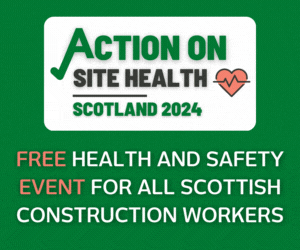Construction sector records sharpest drop in workforce in six-and-a-half years
Activity in the UK construction sector fell back into negative territory last month as the sector recorded the sharpest drop in workforce number since November 2012.

At 48.6 in May, down from 50.5 in April, the seasonally adjusted IHS Markit/CIPS UK Construction Total Activity Index registered below the 50.0 no-change mark for the third time in the past four months. The latest reading was the lowest since the snow-related downturn in construction output during March 2018.
Lower volumes of commercial work and civil engineering activity more than offset a modest increase in house building. New orders also decreased across the construction sector, with survey respondents noting that subdued domestic economic conditions had led to project delays and fewer tender opportunities.
Commercial building was the weakest area of construction activity in May, with output falling to the greatest extent since September 2017. Survey respondents widely commented that clients had opted to hold back on major spending decisions in response to Brexit uncertainty and concerns about the economic outlook. May data also revealed a decline in civil engineering activity for the fourth consecutive month. Construction companies cited constrained client budgets and a headwind from domestic political uncertainty.
Residential work continued to expand in May, albeit at the weakest pace for three months. Higher levels of house building have been recorded in each month since February 2018. The latest survey pointed to a modest reduction in new orders received by UK construction companies, with the rate of decline the steepest since March 2018.
Construction companies reported strong competition, hesitancy among clients and longer sales conversion periods, largely reflecting subdued demand conditions in May. Reduced workloads led to more cautious recruitment strategies and the non-replacement of departing staff in May. As a result, the latest survey pointed to the sharpest drop in construction employment for six-and-a-half years.
Tim Moore, associate director at IHS Markit said: “May data reveals another setback for the UK construction sector as output and new orders both declined to the greatest extent since the first quarter of 2018.
“Survey respondents attributed lower workloads to ongoing political and economic uncertainty, which has led to widespread delays with spending decisions and encouraged risk aversion among clients.
“Commercial building remained hardest-hit by Brexit uncertainty, with construction firms reporting the steepest fall in this category of activity since September 2017.
“Civil engineering work also dried up in May and a fourth consecutive monthly fall in activity marked the longest period of decline since the first half of 2013.
“Construction companies often commented that recent tender opportunities for civil engineering work had been insufficient to replace completed projects.
“House building was the only sub-category of construction output to buck the downward trend in May, but growth remained softer than on average in 2018.
“The soft patch for construction work so far this year has started to impact on staff hiring, with some firms cutting back on expansion plans and others opting to delay the replacement of voluntary leavers.
“May data revealed that the latest fall in employment numbers was the steepest for six-and-a-half years. Survey respondents once again noted concerns that the subdued domestic economic outlook and delays related to Brexit uncertainty had curtailed their near-term growth prospects.”
Duncan Brock, group director at the Chartered Institute of Procurement & Supply, said: “A fragile dreariness descended on the sector this month with lower workloads leading to the fastest decline in purchasing of construction materials since September 2017.
“With the continuing uncertainty around Brexit and instabilities in the UK economy, client indecision affected new orders which fell at their fastest since March 2018 and particularly affected commercial activity.
“The previously unshakeable housing sector barely kept its head above water, growing at its weakest level since February as residential building started to lose momentum.
“The biggest shock however, came in the form of job creation as hesitancy to hire resulted in the largest drop in employment for six and a half years. Not much to be happy about it seems though an easing in some input costs for raw materials offered some relief while energy and fuel prices continued to rise.
“This is unlikely to be nearly enough to turn around the sector’s fortunes, as optimism about the strength of the sector’s future was the lowest since October 2018. Policymakers will need to pull a large rabbit out of the hat, and fast, to improve these difficult conditions and prevent a further entrenchment of gloom and contraction this summer.”
Mark Robinson, Scape Group chief executive, added: “It is disappointing to see construction work drop off in May as increased unpredictability bites and optimism plummets.
“Theresa May’s resignation and a lack of clarity over the future leadership of the current government is hurtling us into uncertainty. We thought progress in infrastructure and safeguarding the future of the construction industry was a low priority before. It will be even further from ministers’ minds now.
“This government won its mandate on a commitment to invest in UK PLC, ensuring the country continues to attract business and good jobs across the whole country. But now a reluctance to spend and a lack of decision making is holding the UK back – stopping the country reaching its potential. And it’s not just big-ticket infrastructure projects like HS2 and Heathrow. Road improvements, traffic islands, and roundabouts are also vital for the efficient running of our day to day lives.
“The only way to increase confidence is to treat today’s economic and political climate as the new normal. That means we need to get on with the business of building. Firms should take advantage of the easing of raw material costs while they can and press ahead with planned projects.
“Only then can we ensure that this weak period for the sector does not turn into a prolonged and painful slump.”





















